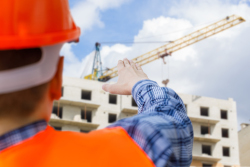Operators and Signal Persons
Operator and Signal Person Don'ts
- Don't operate a crane beyond its rated capacity.
- Don't use a crane to drag or pull loads sideways.
- Don't let the boom and any other parts of a crane contact an obstruction.
- Don't lift loads over the front area of wheel-mounted cranes unless the manufacturer permits it.
- Don't lift a load that is 90 percent or more of the maximum line pull without first testing the brakes by lifting the load a few inches and applying the brakes. Repetitive lifts of such loads need to be tested only the first time.
- Don't do anything distracting, such as texting or talking on a mobile phone, while operating the crane.
- Don't lower the load or the boom below the point where fewer than two full wraps of rope remain on their respective drums.
- Don't increase the crane's rotational speed such that the load swings out beyond the radius.
Stopping multiple-crane lifts. The crane operator and the lift director have the authority to stop a multiple-crane lift if either determines the lift can't be done according to the lift plan.
Refusing to handle loads. A crane operator concerned about serious hazards involving a crane can refuse to handle loads until a qualified person determines there isn't a hazard or the hazard has been corrected.
Knowledge Check Choose the best answer for the question.
6-5. Until a qualified person determines there is no hazard or the hazard has been corrected, what can crane operators do if they are concerned about serious hazards associated with a lift?
You forgot to answer the question!

